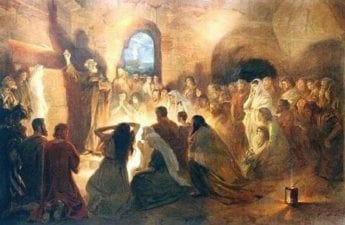Part of our church’s long term strategy over the next few decades is to plant a number of churches here on the Palouse. We already have two Reformed churches here in Moscow, one in Lewiston about thirty miles south of us. Pullman is eight miles to the west, and is in need of a Reformed presence there, and Moscow is certainly capable of sustaining more congregations like we already have.
Our denomination—the Communion of Reformed Evangelical Churches—has six presbyteries containing about a hundred churches from all around the world, from Poland to Japan and back again. These presbyteries meet annually, and then every three years all the presbyteries meet in the same place so that two delegates from each presbytery can meet together in our Council. The fellowship is good, but in the nature of the case it is not a constant thing—we all live pretty far away from one another.
The stumper is this. What are the implications for church polity if we are successful (say) in planting ten churches total over the next forty years? We live in a relatively small town, and all the members of these churches would be part of the same Christian community, and in many cases the members of these different churches would be members of the same families—brothers, cousins, parents, etc. Their kids would be in the same class at the same Christian school, college friends at New St. Andrews would be in different congregations, and so on. It will be a highly textured weave—and we are already seeing a good bit of it.
As it stands now, our Christ Church session of elders meets weekly, for an hour and a half. Every quarter or so we have a joint meeting with the elders of Trinity Reformed, and occasionally the pastor from Valley Covenant in Lewiston sits in with us. With me so far? The boundaries between our churches are frequently porous, and if we haven’t seen someone at church in a few weeks, one of the questions we have to ask is whether they are visiting across town.
When we are posed with a question, our first instinct ought always to be what can we find in the Bible about this? So what follows is a set of suggestive texts, and is not being propounded as anything like a dogma. Just something to put out there. Just something to keep you awake at night.
There are three data points.
One of the biblical criteria for demarcation between churches is geography. In biblical parlance, a church consists of the saints in a particular town. “I commend unto you Phebe our sister, which is a servant of the church which is at Cenchrea” (Rom. 16:1). But the geographic limitation can also be narrowed down to the precise location of a particular meeting. “Likewise greet the church that is in their house” (Rom. 16:5a). Thus the word church (ecclesia) can be applied to the saints in a particular place, and those places can stack or contain one another, like Russian dolls.
Second, the saints in a particular place could be considered part of a unified church even if they met in separate locations or campuses.
“But when divers were hardened, and believed not, but spake evil of that way before the multitude, he departed from them, and separated the disciples, disputing daily in the school of one Tyrannus. And this continued by the space of two years; so that all they which dwelt in Asia heard the word of the Lord Jesus, both Jews and Greeks” (Acts 19:9–10).
So at Ephesus Paul lectured and disputed daily in the rented or loaned Hall of Tyrannus, and his ministry there was so effective that everybody in Asia Minor (modern Turkey) heard the Word about the Lord Jesus. This was a potent evangelistic onslaught. This is likely when the churches of Laodicea, Philadelphia, Colossae, etc. were firmly established.
Now I want to submit that it was inconceivable to imagine that “the saints in Ephesus” all met under one roof. The practice of the early church (for several centuries) was to meet in homes, and the atrium of a wealthy person’s home could hold somewhere between 50 and 80 people. The church in Ephesus, in order to have had the impact it did in that part of the Empire, had to number in the thousands. So the church in Ephesus could also be legitimately called the churches of Ephesus.So the church in Ephesus could also be legitimately called the churches of Ephesus.
And third, despite the multiple congregations, the church in Ephesus (and presumably other places also) had a unified government. “And from Miletus he sent to Ephesus, and called the elders of the church” (Acts 20:17). There was one church in Ephesus with an identifiable body of elders, and yet there had to have been multiple congregations there. This is what creates the polity question. This problem is reinforced if you—as I do—take the angel of the church at Ephesus (Rev. 2:1) as the messenger or pastor of the church there. The polity question is created by the reality of one local governing body and multiple congregations.
Note that this is not exactly the same problem as the question of synods and such. What I am talking about would have had day-to-day pastoral implications, along the lines of “has anyone seen Demetrius lately?” It is not the problem of periodic ecumenical councils, such as the Jerusalem Council (Acts 15), but rather the ongoing issues that would require weekly meetings.
I trust you see the difficulty.


